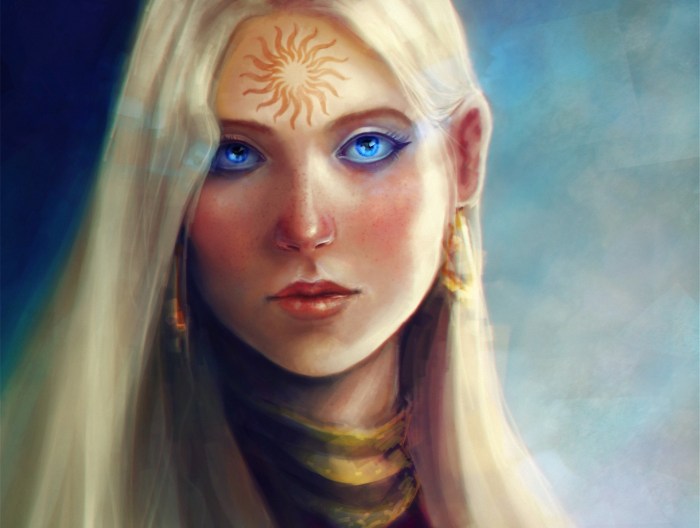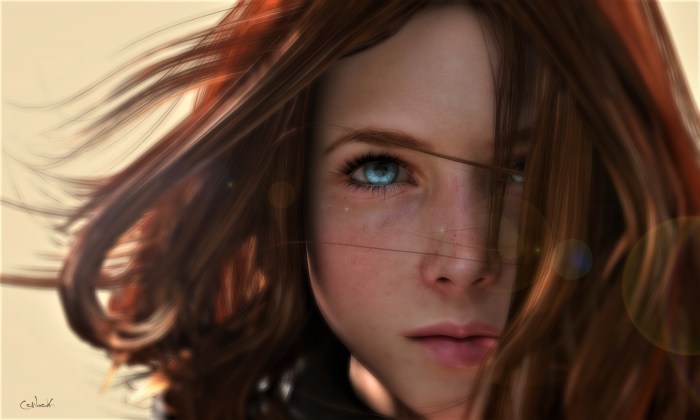Fantasia believes that people with blue eyes possess a unique allure and mystique, a belief that has been woven into the fabric of the film’s narrative. This essay delves into the cultural, societal, and scientific implications of Fantasia’s belief, exploring its origins, examining its impact, and evaluating its validity.
Throughout history, blue eyes have been associated with various cultural and societal attributes, from beauty and nobility to mystery and allure. These associations have likely influenced Fantasia’s belief, shaping the film’s portrayal of blue-eyed characters.
Fantasia’s Belief about People with Blue Eyes
Fantasia, the animated Disney film, portrays a belief that individuals with blue eyes possess unique characteristics and abilities. This belief is exemplified through the portrayal of characters with blue eyes as having a connection to magic, wisdom, and supernatural powers.
For instance, the sorcerer Yen Sid, who possesses deep blue eyes, is depicted as a powerful and knowledgeable wizard. Additionally, the fairies and other magical creatures in the film are often depicted with blue eyes, suggesting a link between blue eyes and the realm of the supernatural.
Possible Reasons behind Fantasia’s Belief
Several factors may have influenced Fantasia’s belief about people with blue eyes. One possibility is that the association between blue eyes and magic and wisdom may have originated from ancient folklore and mythology, where certain cultures attributed supernatural abilities to individuals with unusual physical characteristics.
Another possibility is that the filmmakers of Fantasia drew inspiration from the historical and cultural significance of blue eyes. In some cultures, blue eyes have been associated with nobility, royalty, and divinity, which may have contributed to the portrayal of blue-eyed characters as possessing special qualities in the film.
Cultural and Societal Implications of Blue Eyes
In different cultures, blue eyes have carried various cultural and societal implications. In some cultures, blue eyes have been associated with beauty, attractiveness, and desirable traits.
For example, in many Western cultures, blue eyes have been considered a sign of physical attractiveness, and individuals with blue eyes are often perceived as more trustworthy and intelligent. However, in other cultures, blue eyes may be associated with negative traits, such as coldness or arrogance.
Potential Impact of Fantasia’s Belief
Fantasia’s portrayal of blue-eyed individuals as possessing special abilities could potentially influence how individuals with blue eyes are perceived in society. This belief could lead to positive or negative biases and expectations, depending on the cultural context.
For instance, in cultures where blue eyes are associated with positive traits, individuals with blue eyes may benefit from perceived advantages in areas such as social interactions or job opportunities. Conversely, in cultures where blue eyes are associated with negative traits, individuals with blue eyes may face prejudice or discrimination.
Genetic and Biological Factors Related to Blue Eyes

The genetic and biological factors that contribute to blue eyes involve the production and scattering of melanin, the pigment that gives color to the eyes, hair, and skin.
In individuals with blue eyes, a specific variation in the OCA2 gene leads to a reduction in the production of melanin in the iris, the colored part of the eye. This results in less absorption of light by the iris, causing the eyes to appear blue.
Scientific Evidence, Fantasia believes that people with blue eyes
Scientific evidence supports the genetic basis of blue eyes. Studies have shown that the OCA2 gene variant responsible for blue eyes is present in individuals with blue eyes from various ethnic backgrounds.
However, it is important to note that the inheritance of eye color is complex and influenced by multiple genes. Blue eyes are not solely determined by the OCA2 gene variant but by the interaction of several genes and environmental factors.
Historical and Literary Depictions of Blue Eyes

Blue eyes have been depicted in literature and art throughout history, often carrying symbolic meanings and associations.
In ancient Greek mythology, the goddess Athena, associated with wisdom and warfare, was often depicted with blue eyes. Similarly, in Norse mythology, the god Odin was described as having one blue eye, representing his knowledge and foresight.
Evolution of Societal Attitudes
Societal attitudes towards blue eyes have evolved over time and across cultures. In some historical periods, blue eyes were associated with nobility and high social status, while in other periods, they were seen as a sign of foreignness or difference.
In the modern era, blue eyes are often associated with beauty and attractiveness in many cultures, although this perception can vary depending on the specific cultural context.
Psychological and Behavioral Traits Associated with Blue Eyes

Some psychological and behavioral traits have been associated with blue eyes, although it is important to note that these associations are generalizations and may not apply to all individuals.
Studies have suggested that individuals with blue eyes may be perceived as more trustworthy, approachable, and friendly. Additionally, some research has linked blue eyes to certain personality traits, such as extroversion and sociability.
Scientific Evidence, Fantasia believes that people with blue eyes
The scientific evidence supporting the association between blue eyes and specific psychological or behavioral traits is limited and often inconclusive.
While some studies have found correlations between eye color and certain traits, these findings are often based on small sample sizes and do not establish a causal relationship. Further research is needed to fully understand the complex relationship between eye color and personality or behavior.
Ethical and Social Implications of Fantasia’s Belief: Fantasia Believes That People With Blue Eyes

Fantasia’s belief about people with blue eyes raises ethical and social concerns related to discrimination and bias.
If blue eyes are perceived as a sign of superiority or special abilities, it could lead to unfair treatment or prejudice towards individuals with blue eyes. Conversely, if blue eyes are associated with negative traits, individuals with blue eyes may face discrimination or negative stereotypes.
Responsibility of Individuals and Society
It is the responsibility of individuals and society to challenge harmful beliefs and stereotypes based on physical characteristics, including eye color.
By promoting inclusivity and equality, we can create a society where individuals are valued for their unique qualities and not subjected to discrimination based on their appearance.
Question Bank
What is the scientific basis for Fantasia’s belief about blue eyes?
There is no scientific evidence to support the belief that people with blue eyes possess any inherent qualities or abilities.
How have cultural and societal perceptions of blue eyes influenced Fantasia’s belief?
Cultural and societal associations of blue eyes with beauty, nobility, and allure have likely influenced Fantasia’s portrayal of blue-eyed characters.
What are the ethical implications of Fantasia’s belief?
Fantasia’s belief could potentially lead to discrimination or bias against individuals with blue eyes, as it perpetuates stereotypes and reinforces harmful beliefs.